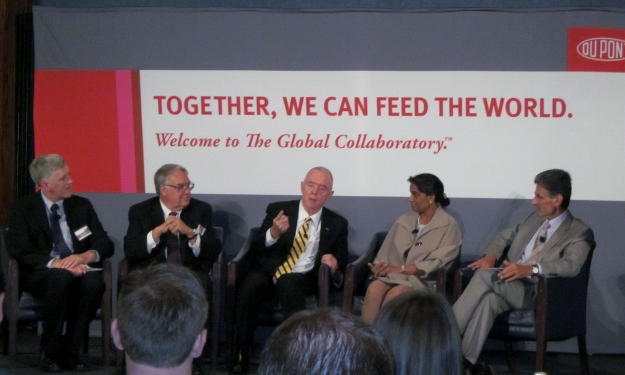 |
| Food Security: DuPont launched its Global Food Security Index Tuesday in Washington, D.C. As part of the program an expert panel addressed topics examined by the project. Panel members included (l-r) Dr. Patrick Westhoff, a University of Missouri professor and director of Food & Agricultural Policy Research Institute; Howard Buffett, farmer and founder of the Howard G. Buffett Foundation; Gen. Barry McCaffrey, U.S. Army, Retired; Ritu Sharma, co-founder and president of Women Thrive Worldwide; and moderator Marc Gunther, contributing editor of Fortune Magazine and senior writer at Greenbiz.com. Not pictured is Dr. Rajiv Shah, administrator of the U.S. Agency for International Development (USAID). See story below |
“As we talked to governments, NGOs and farmer organizations around the world, we’ve come to realize that while we share a common goal of food security, we do not share a common language. To truly address the root cause of hunger, we must have a common path forward to tackle such pressing issues as food affordability, availability, nutritional quality and safety,” said Kullman. “Literally billions are being invested to address food security, but until today, we had no comprehensive, global way to measure food security and the impact of investments and collaborations at the local level.”
The Global Food Security Indexx addresses the underlying factors of food insecurity in 105 countries and points to areas for improvement and reforms.
|
*Every night nearly one billion people go to bed hungry. *There are nearly 150,000 to 200,000 new people in the world to feed every day. *Solutions have to be focused on the local farmer. *Food security is a national security issue; it is also a deep, moral issue. *Points made during launch of the Global Food Security Index |
Global food security is a top concern of many governments as illustrated by the recent G8 and G20 summits. The New Alliance for Food Security and Nutrition, announced at the Camp David G8 Summit in May, highlights the shared commitment among G8 and African leaders, private business and non-governmental organizations to achieve global food security. However, the need remained for a tool that drives precision and accountability of these efforts which led to the collaboration between DuPont and the EIU.
“My hope is the Global Food Security Index will be used to promote collaboration, make better informed decisions and stimulate action necessary to feed our growing population,” Kullman said. “To ensure that efforts are laser-focused to deliver real solutions, we needed a tool to inform decision making and facilitate a common language.”
The EIU created the Index with input from leading international experts who provided dimension to the complexity of food security and informed the design and development of the Index itself.
“The Global Food Security Index measures levels of food security by answering a central question: how can consumers in each country easily access sufficient amounts of safe, high-quality and affordable food?” said Leo Abruzzese, Economist Intelligence Unit Global Forecasting Director. “Because of our extensive modeling approach, we believe this comprehensive tool will help leaders move from rhetoric to results.”
Publically Available Tool Unlocks the Power of Collaboration
The interactive Global Food Security Index is available online at www.foodsecurityindex.eiu.com. Features include:
- Analysis of key findings.
- Definition of 25 global indicators that measure specific aspects of food affordability, accessibility, availability, nutritional value and safety.
- An interactive heat map of overall scores and detail of category results.
- Adjustable weightings to allow for scenario planning.
- The ability to compare multiple countries simultaneously and adjust rankings by indicators.
- A country details page that allows a food-security drill down into individual economies.
- A unique feature will be added to capture the impact of changing food prices on each country’s ability to address food security.
DuPont and the EIU hosted dialogs on food security today at forums around the world – including Belgium, Brazil, South Africa and the United States. Participants included public and private sector leaders.
To learn more about how DuPont is committed to driving food security efforts locally, sustainably and collaboratively, visit www.foodsecurity.dupont.com or follow the conversation on Twitter at #foodsecurity.
| Editor's Note: Scott and Karen Fritz of Winamac were given the opportunity to attend the launch of the Global Food Security Index while Scott was in Washington on business for the American Soybean Association. While such events often seem far removed from Pulaski County, local farmers will inevitably play a role a role with state and U.S. farmers in meeting the challenges of global food security. |
Global Food Security Index examines the core issues of food affordability, availability and quality
WASHINGTON, D.C. - The US, Denmark, France and the Netherlands are the most food secure countries in the world, according to the Economist Intelligence Unit’s Global Food Security Index (GFSI) released Tuesday (July 10) in Washington DC, Brussels, Johannesburg and Sao Paulo.
The index, developed by the EIU and sponsored by DuPont, deepens the dialogue on food security by examining the core issues of food affordability, availability, and quality across a set of 105 developed and developing countries worldwide.
“The rapid rise of emerging markets has increased demand for food of all kinds, but investment and productivity of new supplies haven’t always kept up,” said Leo Abruzzese, Director of Global Forecasting, Economist Intelligence Unit. “Filling the gaps in national food security networks requires a more careful understanding of where the weaknesses are and how to address them.”
Food systems today are under severe and increasing strains from population pressures, high input prices, changing consumer patterns and dramatic weather and price shocks. In this context, the Global Food Security Index looks beyond hunger to examine the underlying factors and key risks affecting food security in a structured, rigorous framework. The index is a dynamic benchmarking model that uses quantitative and qualitative indicators to provide a standard against which countries can be measured.
Beyond the model, GFSI analyses the drivers of food security as a way of fostering dialogue about practical solutions and policy reforms. The index considers the nutritional quality and safety of food—elements missing from similar indices—alongside traditional supply and availability issues. By incorporating a wide range of indicators and geographies, the index enables targeted comparisons to highlight where interventions are most needed. Beginning in September 2012, the index will feature a unique quarterly adjustment, based on shifts in food prices and other macroeconomic factors, that allows it to serve as an early warning of potential price shocks that might compromise or further degrade a country’s food security.
The Global Food Security Index 2012 is available free of charge on the EIU website at: http://www.eiu.com/FoodSecurityIndex
About the Economist Intelligence Unit







